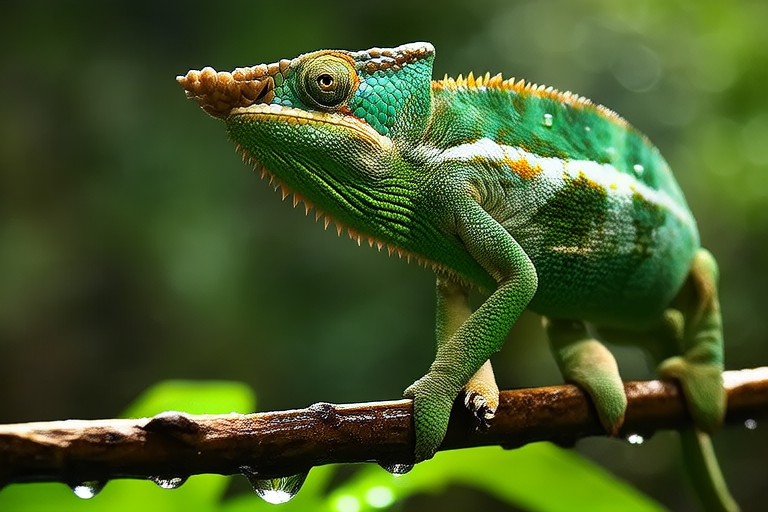Splendid Japalure Care Guide: Tips for First-Time Owners
Welcome to the wonderful world of Japalures! As you embark on this exciting journey as a first-time owner, it’s important to understand the unique needs and characteristics of these delightful creatures. This guide will provide you with all the essential information you need to ensure your Japalure thrives in its new home.
Understanding Your Japalure
Japalures, also known as Javanese Crested Lories, are vibrant, social birds native to Indonesia. They are known for their striking appearance, intelligent behavior, and engaging personalities. With proper care, they can become loving companions, providing endless entertainment and joy. However, owning a Japalure requires commitment and dedication to meet their specific needs.
Dietary Requirements
A Balanced Diet
Feeding your Japalure a balanced diet is crucial for its overall health and well-being. The foundation of their diet should be a high-quality commercial lory food that includes nectar, fruits, and vegetables. It’s important to choose a product specifically formulated for lories, as these birds have unique dietary requirements.
Supplementing with Fresh Foods
In addition to commercial food, supplement your Japalure’s diet with fresh fruits and vegetables. Safe options include apples, pears, bananas, melons, and leafy greens like spinach and kale. Avoid feeding them avocado, chocolate, or any foods containing caffeine, which can be toxic.
Water and Nectar
Always provide fresh water daily, and consider offering a nectar solution made from sugar and water (4 parts water to 1 part sugar). Nectar should be changed frequently to prevent bacterial growth. Additionally, some Japalures enjoy a variety of flowers, such as hibiscus, which can be offered as an occasional treat.
Habitat Setup
Cage Size and Placement
Your Japalure needs a spacious cage that allows ample room for movement and play. A minimum size of 3 feet wide, 2 feet deep, and 3 feet tall is recommended. Place the cage in a quiet yet social area of your home where your bird can observe family activities without feeling threatened.
Perches and Toys
Provide a variety of perches with different textures to keep your bird’s feet healthy and strong. Natural branches or ropes work well. Additionally, offer a range of toys to stimulate mental and physical activity. Rotate toys regularly to prevent boredom and encourage exploration.
Temperature and Humidity
Japalures thrive in warm, humid environments. Maintain a temperature between 70-80°F (21-27°C) and a humidity level around 60%. You can increase humidity by placing a shallow dish of water near the cage or using a humidifier.
Healthcare and Wellness
Regular Check-ups
Schedule routine veterinary check-ups with an avian veterinarian who has experience with lories. These visits are essential for early detection of potential health issues. Regular check-ups also allow your vet to monitor your bird’s weight, feather condition, and overall health.
Common Health Issues
Be aware of common health problems that can affect Japalures, such as obesity, respiratory infections, and feather plucking. Obesity can be managed through a balanced diet and regular exercise. Respiratory infections may require antibiotics, while feather plucking can be addressed through environmental enrichment and addressing underlying stressors.
Grooming and Hygiene
Maintain good hygiene practices by cleaning the cage and accessories weekly. Offer a shallow water bath or mist your bird with a spray bottle to help maintain its plumage. Trim your Japalure’s nails as needed, typically every few months, but consult your veterinarian for guidance.
Behavioral Insights
Temperament and Socialization
Japalures are generally friendly and social birds, but they can be shy when first brought home. Patience and gentle handling are key during the initial bonding period. Spend time interacting with your bird daily to build trust and strengthen your bond. Positive reinforcement techniques, such as treats and praise, can encourage desirable behaviors.
Training and Interaction
Begin training your Japalure with basic commands like “step up” and “come.” Use small, nutritious treats as rewards to reinforce positive behaviors. Training sessions should be short and frequent to keep your bird engaged and motivated. Interactive playtime is also essential for mental stimulation and physical exercise.
Environmental Enrichment
Create a stimulating environment by offering a variety of toys, puzzles, and activities. Rotate items periodically to prevent boredom. Providing opportunities for exploration and problem-solving can enhance cognitive function and reduce stress-related behaviors.
Practical Tips for New Owners
Patience and Consistency
Building a strong relationship with your Japalure takes time and patience. Be consistent in your interactions and routines, as this helps establish trust and predictability. Each bird is unique, so be prepared to adapt and learn as you get to know your pet better.
Emergency Preparedness
It’s important to be prepared for emergencies. Keep contact information for an avian veterinarian readily available, and familiarize yourself with signs of distress or illness in your bird. Having a first aid kit and knowing basic emergency procedures can make a significant difference in a crisis.
Community and Support
Becoming part of a community of Japalure owners can provide valuable support and resources. Join local bird clubs or online forums where you can share experiences, ask questions, and learn from others. Networking with fellow owners can enrich your understanding and enjoyment of your pet.
Conclusion
Owning a Japalure is a rewarding experience filled with love, laughter, and companionship. By providing a nurturing environment, a balanced diet, and attentive care, you can ensure your bird lives a long, happy, and healthy life. Remember, each Japalure is unique, so take the time to understand and appreciate your pet’s individual needs and personality. With patience, dedication, and love, you’ll create a lasting bond that will bring you years of joy.
